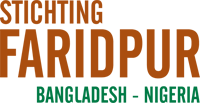Plastic Surgery Camp October 2012 (Nigeria)
Report by Geke Hoeksma.
Team members:
Cees Spronk, leader of the team and plastic surgeon
Jan Willem Kortleve, plastic surgeon
Rob Niemeijer, anaesthesiologist
Geke Hoeksma, assistant anaesthetist
Fatima van Klaveren, operation assistant
Geert Wijnsma, operation assistant
Marije Smittenberg, trainee plastic surgeon
Neeltje Spronk-Mulder and Jennifer Niemeijer-Heaton representing the Faridpur Foundation.
Again a mission to Mangu. For Rob, Fatima and myself the fourth time. After 17 hours of travelling and a cordial reception by Kefas (head nurse in Mangu) and driver Sati on the airport, we arrive late at night at the Sisters of Divine Love, a hotel of Cocin (Church of Christ in Nigeria) near Abuja. After a good night’s rest we leave the next morning by truck (borrowed from the leprosy foundation) and by the rickety bus of the home for handicapped children for the long journey to Mangu. During this trip the bus comes to a halt because of a broken belt somewhere in the engine. The men repair it with a piece of wood from the bush and then we can continue our journey. A bit further the wooden wedge has to be fixed again and after six hours we finally arrive at our guesthouse safely.
Here Phoebe, our cook for the next two weeks cordially welcomes us. Just like the bus the guesthouse has to be replaced urgently. There is no fresh water, and there are many insects. There is only electricity during the day and in the evening when the generator is running. We will have to make do with it, because hotels are nowhere to be found here. A new operation building is under construction, for which the Faridpur foundation raised money. The walls have already been built. After Phoebe’s delicious meal with rice and chicken we take a shower, which means pouring a bucket of water over our body while standing in a tub with water drainage but no running water. You cannot use too much water as it will run out quickly. After the shower we decide to turn in early.
On Monday we select the patients. They are put on a list, but the programme is much too long for operating on Tuesday on two tables for ten hours, but still we will try. This Tuesday five patients do not show up, which is a lot. We are ready at half past five. If these patients had shown up it would have been a very long day, not only for us, but also for the local people who start at six in the morning sterilising the instruments and mopping the floors so that everything is ready when we come at eight.
Rob and I are very pleased that Cees bought a device that can check the patient’s saturation and CO2, which results in a better narcosis. This week the Glostavent works overtime. Its power supply often fails. Occasionally (when the current is only 120 volts instead of 220) the Glostavent stops and then there is no O2 supply for the patient. It often concerns a small child whose SaO2 gradually drops. After some urgent requests the generator is started so that the saturation of the child reaches 100 % again. Every now and then Rob’s and my adrenocortical hormones suffer. That is why we use ketamine and jungle juice (local anaesthesia)for the patients. With the Glostavent adult respiration is impossible; for children is it only just possible. It is not intended for this as this device produces O2 taken from the outside air. There are no O2 bottles here or something like that.
We perform 79 operations, mainly burn contractions, cleft palates, some hypospadias, a couple of keloid reductions, eye-lid corrections and a total nose reconstruction (after an accident the nose had gone). Twenty-one patients have not shown up, which was probably caused by riots in the villages so that people could not leave their homes. On the last day Cees gave a lecture on burns and handed out the certificates to the doctors and nurses. The latter is very tricky as the nurses who were given a certificate last year went to another hospital with it and were employed there because of this certificate. Perhaps we should not do this again? That evening we had dinner for the last time with the vicar and the board of the hospital in our guesthouse: Phoebe’s rice and chicken. We were all given a dress or a shirt in recognition of our work for the hospital, which was very kind. On Saturday we travelled home with two stops due to engine trouble. Fortunately we arrived at the airport in time and after travelling for 24 hours we are back home on Sunday morning, where an MRSA test is done. On Monday we have to go to our regular jobs again. It was a very useful and cosy period.
Geke Hoeksma

